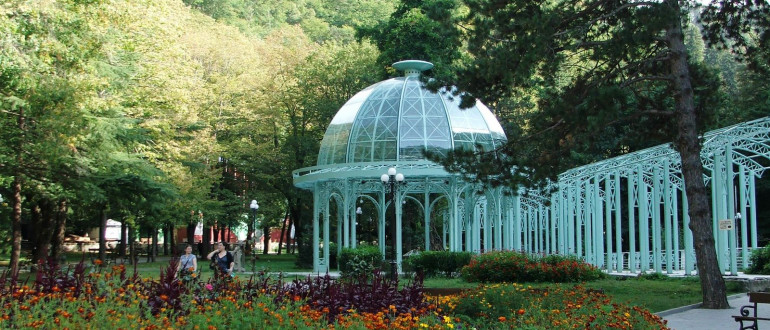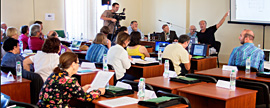The third international conference with the title ”Problems of folk polyphony” (and the last one to be held in Borjomi), took place on October 15-22. It was a joint venture of the Tbilisi State Conservatory, Tbilisi State University, the Union of Composers of Georgia, and the Georgian Choreographic Society. The next, the fourth conference was planned for 1991, invitations were sent (even the abstract of Dieter Christensen was received), but the worsening political and economical situation, then the civil war of 1991-1992, and the wars in Ossetia and Abkhazia made any follow-up conference impossible for a decade. Extended abstracts of the 1988 conference papers were published (Jordania, 1988c). Here is the list of the scholars and their papers according to the conference program:
1. Izaly Zemtsovsky, Russia, Leningrad. “Specifics of polyphonic articulation: Texture and timbre”.
2. Barbara Krader, USA “Traditional polyphony in Bulgaria”.
3. Susanna Ziegler, Germany, Berlin. “Caucasian polyphony in the mirror of German musicology”.
4. Margarita Mazo, USA “Types of Russian Polyphony”.
5. Dragoslav Devich, Serbia, Yugoslavia “Traditional two-part singing in Serbia”.
6. Nguen Van Nam, Vietnam (Russia), Nalchik “Polyphonic types in traditional music of Vietnam”.
7. Tamaz Gabisonia, Georgia, Tbilisi State Conservatory. “Ostinato polyphony in Georgian traditional music”.
8. Nailia Almeeva, Tatarstan (Russia), Kazan. “Fifth-Third texture [one of the types of polyphony] among Christened tartars and its analogues among the peoples of Middle Volga Region”.
9. Christopher Arakelov, Georgia, Tbilisi State. “Cadence in Georgian (Samegrelo) traditional polyphonic songs”.
10. Igor Macievsky, Russia, Leningrad. “On the role of the socio-psychological factors in the establishing of polyphonic texture in the compositions of traditional instrumental ensembles”.
11. Oleg Gerasimov, Russia, Mari. Yoshkar-Ola. “Genre and regional peculiarities of Mari polyphony”.
12. Larissa Khaltaeva, Kazakhstan, Alma-Ata. “The phenomenon of drone polyphony in the system of cosmogonist images of Turkic-Mongol peoples”.
13. Joseph Jordania, Georgia. Tbilisi. “Genesis of polyphony and the origins of articulated speech”.
14. Martin Boiko, Latvia, Riga. “Ethno-historical aspects of Latvian drone polyphony”.
15. Ketevan Baiashvili, Georgia, Tbilisi. “The problem of the origins of Georgian polyphonic dirges and funeral hymns”.
16. Eduard Barsegian, Armenia, Erevan. “On polyphony in Ancient Armenia”.
17. Villis Bendorf, Latvia, Riga. “Some preliminary remarks on the links between Baltic and Caucasian polyphony”.
18. Tamara Blaeva, North Caucasia (Russia), Nalchik. “Traditional types of polyphonic textures in Adighian traditional songs”.
19. Liudmila Bojarkina, Mordva (Russia), Saransk. “Mordvinian and South Russian polyphonic traditions (question of interrelationships)”.
20. Nikolai Bojarkin, Mordva (Russia), Saransk. “On the issue of common features of traditional vocal and instrumental music of Mordva”.
21. Liubov Berger, Russia, Moscow. “Georgian folk polyphony in the context of the origins of West European polyphony”.
22. Edisher Garakanidze, Georgia, Tbilisi. “Considerations of the origins of Georgian polyphony”.
23. Nato Zumbadze, Georgia, Tbilisi. “On antiphonal polyphony (on the materials of women’s songs from East Georgia)”.
24. Mzia Iashvili, Georgia, Tbilisi. “On the structural principles of Georgian neumatic writing in the light of Ioanne Petritsi teaching”.
25. Viacheslav Kartsovnik, Russia, Leningrad. “Secondal diaphony in Medieval Italy and in the Balkans”.
26. Mikhail Lobanov, Russia. “Russian traditional polyphony of the Pynezh region according to contemporary materials (60th anniversary of the publication of “Pynezh songs” by E.V. Gippius and Z.V. Evald)”.
27. Valerian Magradze, Georgia, Tbilisi. ”Characteristic melodic formulas as an important structural element of Meskhetian traditional music”.
28. Tamar Meskhi, Georgia, Tbilisi. “Georgian polyphonic urban songs”.
29. Iaroslav Mironenko, Moldavia, Kishinev. “On the double nature of unison singing”.
30. A. Mozias, Russia, Leningrad. “On the study of traditional polyphony from the point of view of singers behavior and self-assessment”.
31. Mariam Ositashvili, Georgia, Tbilisi. “On the interrelationships of the parts in Georgian chants”.
32. Daiva Rachiunaite, Lithuania, Vilnius. “The role of the “collector” in forming the sutartines”.
33. Maria Roditeleva, Russia, Ufa. “Polyphony as the essence of the musical process in Russian folk music”.
34. V. Sai, Russia, Leningrad. “Elementary contrapuntal forms in musical cultures of written and oral traditions: Towards the establishing of the united theory of counterpoint”.
35. Vaike Sarv, Estonia, Tallinn. “Polyphonic dirges in the singing traditions of Setu”.
36. Elena Khodorkovskaia, Russia, Leningrad. “The problems of traditional polyphony in theoretical conception of B.L. Yavorsky”.
37. Nino Tsitsishvili, Georgia, Tbilisi. “Balkan-Georgian musical-ethnographic parallels”.
38. Evsevi Chokhonelidze, Georgia. Tbilisi State Conservatory. “The phenomenon of Georgian folk polyphony”.





